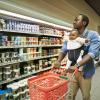
For caregivers who feel cut off from their normal social networks due to the COVID-19 pandemic and left with potentially fewer resources to bridge the gap, finding the right balance of support is a critical means of coping. Local new parent organizations have pivoted to provide a virtual village from day one through low-contact supply distribution, online support groups and individualized mentoring.
Building an early support system
Many parents cultivate their village, even before birth, by turning to doulas — trained professionals who provide continuous physical and emotional support around the birth process — and lactation consultants who can provide virtual sessions to help set families up for breastfeeding success.
A prenatal lactation consultant? You read that right. According to Jen Hamilton, director of Doula Services for The Perfect Push, “When we have the discussion prenatally about health issues and what the equipment we’re working with looks like, we can start to make adjustments to expectations and what our plan might be ahead of time.”
Helping families meet basic needs
While everyone optimistically hoped the pandemic would pass quickly, the staff at FamilyWorks worked to meet families’ immediate needs by re-opening their food banks with additional safety protocols and connecting families with rent and employment assistance. Families could also pick up kits with themed activities and supplies, as well as self-care packets filled with mindfulness techniques that were translated into seven languages.
Other adaptations — such as appointment-based free “shopping” at a new Community Closet — took more time and creativity. Edsel Blanche, manager of the Family Resource Center, recalls, “We rented out a conference room and set it up as a store. We have clothes on racks and shelves to display toys and books. A lot of families appreciate it because they’re not able to access these things anywhere else.”
For other families, Ashleigh Ligon shared how Open Arms Perinatal Services started offering Pod Pick-ups. Families, or their doulas, can pick up hygiene, lactation and baby supplies or have them delivered with little or no contact.
In a recent blog post, Amara — an organization that supports children, families and adoptees impacted by foster care and adoption — notes that factors such as food or housing insecurity and a lack of community support contribute significantly to neglect, sometimes leading to children entering foster care. Meeting these needs is critical to keep families together and thriving.
New offerings provide extra tools in the toolkit
After researchers at the Seattle-based Committee for Children read about an innovative and highly regarded text-based mentoring platform for new parents, their innovation lab partnered with NurturePA to bring the experience to Puget Sound families: NurtureSeattle was born this spring to resounding interest.
Beth Graves, NurtureSeattle’s community outreach manager, shares, “Getting support through text matched the reality of what it’s like to be a parent, because you could respond to somebody at 2 a.m. while you were nursing or not getting to sleep if you were still expecting … When you’re in the doctor’s office and your provider is asking you questions about your well-being, you have to answer in the moment and be prepared, and this doesn’t force people into that space.”
Supporting families by supporting group leaders
As support groups transitioned to meeting virtually, Giulia Canali, a doula who has led multiple PEPS (Program for Early Parent Support) groups before and during the pandemic, admits, “My biggest question was — how am I going to make this feel organic? How am I going to give a chance to every family to feel like they belong?”
Jennie Capron, a community connector for PEPS, recounts how leading groups themselves helped staff members figure out best practices to share with other facilitators. She says, “We started pretty quickly doing weekly leader chats where leaders could come in and talk with other leaders and PEPS staff so that we could answer questions.”
Leaders appreciated the ability to bounce ideas off others while they figured out the best virtual platform to use, practiced ways to create community and adapted topics to fit the current environment.
PEPS also does a biennial review of the topics in its leader binder that happened to land in 2020 — updates are being released to group leaders starting this fall. Timely edits to the “Racial and Social Identity” and “Emotional Changes and Challenges” topics, combined with additional training this summer, helped bolster discussions of protests for racial justice and families’ feelings around the pandemic.
Facilitators step up to cultivate community with creative solutions
Meredith Rawls, an astronomer at the University of Washington, recalls that with activities canceled and no commute, “I had gotten pretty good at Zoom, thanks to months of the pandemic, and thought, you know what, I can't go to orchestra rehearsal, but I could carve out a few hours a week to help folks having the hardest time of their lives times two right now.”
All the leaders I spoke to advocated breakout rooms (a Zoom feature that splits participants into small groups) and communication between meetings to help families bond. Rawls — along with fellow leaders Marloes Koning and Stacy Sayles, who both led multiple virtual groups this year — also came up with creative strategies to nurture connections during virtual meetings.
Rawls says, “I wound up having one day be a ‘virtual tour of where baby sleeps’ so we could get a glimpse into everyone’s house and then asking for volunteers to either read a book or share a song in the following weeks.”
Koning added fun icebreakers in the initial weeks, with prompts such as “If you were to name your baby after your top pregnancy craving, what would it be?”
Sayles’ group added seasonal fun through a virtual Halloween happy hour with babies in costumes and hand-offs between partners to allow for socializing.
When faced with the inevitable tech glitches, Luisa Fernanda Vargas — who led a FOCS (Families of Color Seattle) group for Spanish-speaking families — says, “We may speak but still be on mute, we may freeze, we may completely disconnect. I think finding the humor in those moments is essential, especially in these parent groups. Parents already have many serious things they are constantly having to sort through. These moments are small in comparison, and keeping that perspective helps keep the mood light when technology is not cooperating.”
Flexible options help families with older babies
In the first few months with newborns, support groups have the inevitable interruptions of crying babies that can be fixed with a mute button, but what happens when your older baby or toddler can simply exit stage left?
When FamilyWorks transitioned its Spanish- and English-speaking playgroups to a virtual format, parents appreciated the opportunity for social interaction with young children. Anindita Chatterjee, a virtual playgroup participant and FamilyWorks board member, recalls that when toddlers were distracted, facilitators re-engaged them with physical activities such as yoga poses or treasure hunts around their living space.
When leading Baby Peppers and Second Time Around groups, Canali says she had to allow more flexibility along with the shorter time format. “Halfway through, I remember sending this email saying, ‘I know this is really difficult. Don’t feel like you have to be there for the whole time. Even if you can just pop in and out, share a high and low and just go.’”
Addressing the effects of structural racism on families
Maternal and infant mortality rates and associated negative mental health outcomes are higher for Black women than their white counterparts, the global pandemic disproportionately affects people of color and violence continues against Black and Indigenous people. If there’s a time when families of color deserve support more than ever, it’s now.
FOCS provides a safe and affirming space to process adjustments to new parenthood within the context of a racialized identity. To expand accessibility, FOCS Executive Director Christine Tang says, “As soon as it became clear that we could not offer in-person services, we made the decision to not have any fee for parent groups, regardless of income. We wanted to remove any type of barrier to make it as simple as possible to register.”
Providing a mirror of support is key for doulas at Open Arms Perinatal Services who serve families speaking up to 12 languages (including Amharic, Tagalog and American Sign Language, among others) and come from the communities they support. Families appreciate the backing of someone who understands their unique needs and provides long-term care (up to two years postpartum).
When reaching out to the diverse team at The Perfect Push, families can opt for a doula who looks like them, but Hamilton adds, “Because of the disparities we see, having a white person be their person in the birth room is seen as really protective by some families.”
Supporting families of color also needs to include educating white families on their responsibility to practice anti-racism. White group leaders and participants who were raised to believe they are “colorblind” will likely feel uncomfortable talking about race or believe their kids are too young for addressing concerns related to racism. Screen-sharing visual aids, such as a chart from the Children’s Community School, can help illustrate to parents how children begin to notice race shortly after birth.
PEPS has emphasized the importance of discussing race and racial disparities by recently making them required topics. To support facilitators, the organization provides resources and virtual training that encourage strategies such as naming the discomfort, amplifying voices of color and focusing on actions parents can take.
Families bond from the comfort of home
While many parents experienced initial reservations about virtual meetings, Katie Lewis, a participant in Amara’s STAR (Strong Tough and Resilient) adoptive parent group, says that her facilitators shared their own experiences and challenges and “helped create an atmosphere that felt like we were going through this parenting journey together and everyone was still figuring things out day by day.”
Tang agrees and thinks about what the pandemic would have been like a few decades ago. She emphasizes, “We’re really fortunate to have access to technology that allows us to be in virtual spaces, with people safely [participating] without having to leave home.”
For Carrie (*last name withheld for privacy), who joined an Amara STAR group, joining a safe space meant acknowledging problems in the foster care and adoption industry and learning about ways to drive progress. She recalls, “I came into this really wanting to hear about others' experience and advice around engaging and deepening relationships with birth family members. … It was really helpful to have others to talk to about this parenting experience that's pretty unique to adoptive families and foster families.”
Most new parent support programs offer flexibility in their structure, which allows families to focus on top-of-mind topics. Child care and work-life balance come up frequently, but Celita Lee’s PEPS group shared how the pandemic brought up some struggles with developing a new identity as a parent. Normally, the primary caregiver gets time alone with their baby to figure out a routine, but with the other parent working from home all day, Lee says, “It’s like learning a language and having someone who speaks fluently listen to you learning. They’re all just trying to be moms or dads and they don’t get that alone time because there’s always someone in the house watching.”
Virtual participation did offer some perks. Leah Knowles Bond, a PEPS newborn group participant, appreciated the convenience of joining from home. She says, “If we needed to put the baby down, we could go ahead and step away for a few minutes, versus waiting until we got home.”
Nicole Holland was able to access additional resources because she didn’t have to commute with her baby. In addition to her PEPS group, which provided a place to commiserate about issues with sleep and fussiness, she knew she needed additional support centered around postpartum anxiety and joined a new parents group through Swedish Health. She even helped a friend from PEPS who was going through some of the same challenges by inviting her to join.
Maximize impact with these tips and tricks:
Thinking about getting your family some virtual support? Here are some strategies that can help you get the most out of your experience.
1. Take yourself off mute.
Baring your soul on Zoom is hard, but it helps build trust and community. When Celita Lee’s group brought up postpartum sex as an aside, she says it was like the tides changed in their meeting as all the parents chimed in and had feelings about the topic.
Along with allowing vulnerability, do your best to be present and attend all meetings. You may need to duck in and out to grab dinner out of the microwave or warm a bottle, but faithful attendance helps the group dynamic thrive.
2. Hold space for challenging topics.
A theme echoed by the white group leaders I spoke to was that they felt nervous about leading a discussion about race, but ultimately felt it was educational for themselves and the group.
Dismantling prejudice and structural racism requires listening to others’ experiences, recognizing our own racist actions and privilege (and putting it to use!) and creating an environment where we can model anti-racist actions for our kids starting at an early age. As Meredith Rawls, a recent PEPS leader, notes, “Unpacking racism is hard in general, harder over Zoom, and harder still when babies demand attention. But folks were willing to listen, be vulnerable, and share their experiences and hopes.”
3. Mix and match resources for the best fit.
As Beth Graves from NurtureSeattle points out, “Because [the NurtureSeattle text-based platform] is free and low-barrier, it doesn’t have to be the only system you’re looking for. It works in conjunction with being part of a virtual group. It works with seeing a lactation consultant or a doula or whoever is in your bubble.”
4. Leverage a community of support organizations.
Ashleigh Ligon of Open Arms Perinatal Services notes, “A lot of our team is familiar with other organizations. If there’s a need, we figure out how to fill it. It’s so important for parents to know that they can reach out and feel they’re not alone.”
If you’re having trouble accessing culturally relevant support services, or if your finances make affording diapers a challenge, don’t be afraid to ask one of the featured organizations below. They have connections to a plethora of resources and can help you find the right fit (even if it’s not with them).
5. Put on your own oxygen mask first.
Perinatal mood and anxiety disorders (PMADs) exist along a spectrum and affect non-birthing parents as well. During this time when PMADs are intersecting with other COVID-driven stressors, PEPS facilitator Marloes Koning shares her own experience with families as a gentle nudge to encourage new parents to get help if they’re experiencing symptoms. Virtual options are available and often at low or reduced cost.
Find your villageAmara — Supporting families, children and adoptees impacted by foster care and adoption, Amara has transitioned its 7-week Strong, Tough and Resilient (“STAR”) adoptive parent support group to a virtual format and hosts virtual informational sessions for prospective foster families. Families of Color Seattle (FOCS) — Founded and led by women of color, FOCS (pronounced “folks”) hosts virtual groups for expecting families, parents of newborns and waddlers (Spanish- and English-speaking), as well as weekly informal virtual connections to practice mindfulness and a “Tell It Tuesdays” happy hour. A new group for queer and trans families of color is also kicking off soon. This recent ParentMap article shares more about the organization. FamilyWorks — The organization currently hosts four virtual groups: Caregiver Check-in, Chicas de Hoy Women's Empowerment Group, and playgroups in English and Spanish, which are designed for kids from birth to age 5. At food banks in Wallingford and Greenwood, families can receive diapers and wipes, kids’ activity packets and self-care information for parents that has been translated into seven languages. NurtureSeattle — Provides personalized support via a text-based platform and connection to experienced mentors. Mentors stay with parents for at least a year following their baby’s arrival and offer encouragement, tips and tricks, and local resources. The organization also hosts periodic roundtables and webinars to talk about hot topics such as changing relationships and new resources. Open Arms Perinatal Services — Doulas with roots in the communities they serve provide culturally relevant care before, during and after birth at no cost and in up to 12 languages. The organization also provides essential supplies for newborn care and lactation through no-contact deliveries, as well as drop-in virtual lactation lounges that are open to all nursing caregivers. PEPS — PEPS offers a variety of programs that generally meet for a duration of 6–12 weeks, all of which are currently virtual in format: Newborn, Second Time Around (attended by one parent for families with more than one child) and Baby Peppers (for families with babies ages 5–12 months). The new Connecting the Expecting is a 6-week group for adoptive and birthing families before the baby’s arrival. PEPS has also recently introduced a pilot program for LGBTQIA+ parents and caregivers. Additionally, PEPS partners with Perinatal Support Washington to offer Adjusting to Parenthood, a drop-in group facilitated by a licensed therapist. The Perfect Push — At a time when fewer in-person services are available, The Perfect Push carefully provides doula support starting in the last month of pregnancy and continuing through delivery and the postpartum period. Lactation support is available via telehealth or in person. Breastfeeding and newborn care classes are available virtually and are currently free to uninsured or underinsured families. Also, check out founder Rue Khosa’s Instagram page (@rue_theboobboss) for humor-filled lactation and new parenting advice. |











